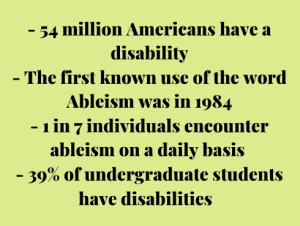Opinion // We matter too
The issue with school’s treatment of students with disabilities
April 8, 2022
Do you remember elementary school? Back when we still had recess. When the weather was good and you’d go outside and play around, laughing, smiling? Good times, huh? Yeah, not for everyone.
As an autistic person, recess was always a living nightmare for me. Sensory overload, swinging alone because I didn’t know how to interact with my classmates, not being able to actually do any activities because of my lack of coordination. Most teachers never let me stay inside, either. This is just one of the many, many ways the school system fails disabled people.
Not being able to stay inside during recess hurts more than it helps. It hurts chronically ill kids who only have so much energy to use, autistic kids who get overstimulated easily. And all of that is just the tip of the iceberg.
Ableism is the discrimination and social prejudice against people with disabilities based on the belief that typical abilities are superior, according to Access Living.
Ableism in schools doesn’t stop at the elementary level; it only gets worse. Middle and high schools not allowing phones or devices, forcing P.E for credits, not allowing bathroom breaks at anytime, punishing tardies and absences/rewarding attendance, randomly calling on students, forcing presentations/eye contact, not having ASL classes required or even available, punishing late work – the list goes on.
Kids with chronic illnesses aren’t given the resources they need to function, and then are punished when they can’t. Kids with ADHD are commonly seen as problem children with behavioral issues. Autistic kids are commonly seen as gifted or talented and then reprimanded when they burnout. Physically disabled kids are excluded from basic things that every student should have access to.
 That’s all due to the school system.
That’s all due to the school system.
School officials swear up and down they care about disabled students, but none of us see it. I grew up being punished for not masking things I should not have had to mask. I missed out on opportunities because they weren’t accessible to me. I was never given resources that should’ve been easy access. Things like rooms for sensory overload, the option to not do something out of my boundaries. Almost every single disabled student will tell you this exact same thing.
They care so much about disabled students, but they teach nothing of disabled history. They don’t use the correct terms for your disabled students. They don’t punish or even call out students who enforce stereotypes and ableist language.
But honestly, how are kids ever supposed to know not to say these ableist remarks when they do? I’ve never once been in a class where they talked about people important to disabled history, used the correct terms, and encouraged disabled students.
I’m not asking for a parade – I’m asking for equal treatment.
Only 41% of disabled students with disabilities enroll in college, according to the Washington Post. Only 41% of autistic people graduate high school. 58% of chronically ill students miss school routinely. 35% of dyslexic students drop out of high school.
Are you seeing the problem yet?
Sure, there are people who say this is an exaggeration. That schools treat everyone the same and it isn’t their fault if students can’t handle it, or if kids are lazy and don’t want accountability.
For lack of better phrasing – this is literally the worst take I’ve ever heard in my life.
We’re disabled. Call it what it is. We are not lazy. We are not stupid. We are not your pets or be kind projects. We’re not your controversial opinion. We are disabled. And schools need to treat us like it.
Stop acting like disabled is a bad word. Stop treating disabled kids like we’re not good enough unless we’re fitting to your able bodied and neurotypical standards.
Reform the school system. Require ASL classes, change the grading system, stop enabling systemic ableism. Stop hiring people with ableist beliefs – and fire the ones that have them. If the schools did a better job of accommodating to disabled people, not only would graduation rates be higher, there would also be less behavioral problems.


